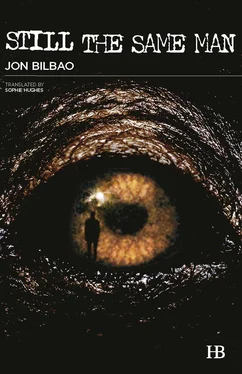He nodded, wiping the sweat from his forehead. He let go of the cane and stared, stunned, at the machete, as if he didn’t know what it was. He put it down on the bed, then rubbed his hands over and again on his pant legs.
“Are you sure you’re OK, darling?” the woman insisted.
Instead of responding, the professor turned to Joanes and asked, “Is there a first aid kit in that backpack of yours?”
Joanes nodded. Dragging his feet, the professor went to get the backpack. He turned on the flashlight for more light. He took out the first aid kit and examined its contents. Next he dragged Joanes over to a wall and propped him up against it.
“The hand first,” he said.
He cleaned it with water, disinfected it, and then, for want of a better option, cauterized the base of the two severed fingers using silver nitrate sticks. He worked with the same care he would have shown his own son. Joanes let him. The professor bandaged Joanes’s hand and mocked up a sling. Lastly, he took care of the blows to Joanes’s face.
“We’ll need to straighten up that nose.”
But when he went to do so, Joanes recoiled, saying, “No, no. .”
“We should do it now rather than later.”
“I don’t want to.”
“Suit yourself. It’s your nose.”
Joanes’s treatment left the first aid kit nearly empty. Once he’d finished, the professor got to his feet with a groan. The man was still unconscious, and his monkey didn’t pay any of them the slightest attention. Joanes contemplated his pinky. To see it lying on the floor among the trash made him feel a kind of self-pity he’d never felt before. The only sound to be heard was the howling wind.
The professor put the first aid kit back in the backpack and then pulled out the satellite phone.
“Leave that alone!” said Joanes.
He tried to get to his feet, but the pain stopped him.
“It won’t take more than a minute,” said the professor. “It’s best if you stay still.”
With trembling fingers, he dialed a number and waited.
“The lines are up. It’s ringing,” he told his wife.
She had sat up and waited with one hand resting on her chest. She looked as though all the blood had drained from her face.
The dial tones rang for what seemed like an age. Then the professor had a kind of paroxysm when at last someone answered. He pressed the phone against his ear and covered the other one to isolate himself against the noise of the storm. Clearly anxious, he repeated a name various times, that of their son’s partner.
“Is that you? I can’t hear you too well. . yes? Is that you?”
The professor told the person down the line who he was and without further ado asked about his son. He repeated the question, spacing out the words to be clear. Then he went silent.
“So, he’s OK?” he asked apprehensively.
Another silence.
“What you mean is he’s going to be OK.”
Another pause. Then, looking at his wife with a great smile, he said, “He’s out of danger.”
Very slowly, she laid back down and closed her eyes.
The professor went on talking for a while, garnering more details about what had happened — the explosion of an air tank during a diving trip; the guide had died; several nearby boats had seen it all happen and someone had requested help over the radio; a helicopter didn’t take long to arrive and rescue the professor’s son and his partner. The professor repeated every new piece of information for the benefit of his wife.
“Yes, of course we’re going to come,” he said. “But we can’t say when. We’re still in Mexico, stuck in this hurricane. Yes. . good. . good. . I’m so grateful. Please, don’t let him out of your sight. . no. For the time being there’s no number you can reach me at, but I’ll contact you as soon as possible. . yes? Hello? Can you hear me? Are you still there?”
He looked at the telephone screen. The connection had gone.
“Battery’s dead,” he said.
He went back to his wife’s side. On the way, he dropped the telephone into Joanes’s backpack. The old couple hugged.
“Thank God, thank God,” they said.
A few moments later, the professor pulled slowly away from her. Shaking and trying not to look either his wife or Joanes in the eye, he walked off to the adjacent room, closing the door behind him.
The professor’s wife rifled around in her travel bag and pulled out a pocket mirror, which she proceeded to use to check her appearance. She sighed, then took a hairbrush and calmly ran it through her hair without taking her eyes of herself in the mirror. She behaved as if she were in her own bed, in her own room, and as if she’d forgotten everything that had gone on that night. The color had returned to her cheeks. She looked as though she were about to get up and start walking around the cabin.
“I could do with a cigarette,” she said. “You don’t have one, do you?”
Joanes shook his head.
“That’s a shame.”
“What’s your husband doing in there?”
“He’s crying.”
Joanes glanced over toward the door to the other room in surprise. You couldn’t hear a peep coming from inside.
“I’m sorry about what’s happened to you,” she said, “but it was necessary. You would have done the same, or worse, if you’d been in our place. You’re angry right now, which is perfectly understandable, but with time you’ll forget all about this. You should try to put it to the back of your mind. The storm will soon pass, and that horrible black man and his monkey will be gone. Then we’ll get our story straight, a story where we all come out well. We’ll say the black man tried to rob us and that you defended us. Then you’ll be reunited with your family, and we’ll go and look for our son. Life will go back to normal, for all of us.”
“I’m not angry. I’m furious.”
She gave an understanding nod.
“You’ll get over it. Don’t try to challenge my husband. He knows how to handle things, as you’ve seen for yourself. That anger you feel isn’t enough. It hasn’t changed you. You’re still the same man you were before.”
Joanes tried to get to his feet, but the pain forced him back down again. He took a deep breath, gathering his strength for a second attempt. This time he did manage to get up. He stumbled one or two steps forward and, before doing anything else, bent down to recover his pinky from the floor. He looked at it for a second and put it in his backpack. Then he moved to the bed, took the machete from where the professor had left it, and placed it in his belt. He walked over to the stranger.
“What are you doing?” she asked.
“Seeing if he’s all right.”
The man was still unconscious. Joanes took one of the bottles of water and poured a little on the man’s face. He waited, then poured some more on his face and neck. The man groaned, opened his eyes, and then closed them again.
“How are you doing?” asked Joanes.
The man tried to move but discovered that he was tied. Gagged, he could do nothing but groan. Joanes thought then that he seemed even older than he had before.
“Can you hear me?”
The man nodded.
“When you’re with your monkey and you don’t want him to come near you, how do you do it?”
The man opened his eyes wide and turned his head, looking for Gagarin. He seemed to calm down when he saw him safe and well. The chimpanzee, still holding on to the remains of Joanes’s ring finger, was picking things out of his fur with the tips of his own fingers, inspecting them, and then popping some of them into his mouth.
“How do you keep him at bay?” Joanes repeated.
“Why are you asking him that?” asked the woman.
“Did you not see what that animal just did to me? I want to know how to keep it under control.”
Читать дальше












